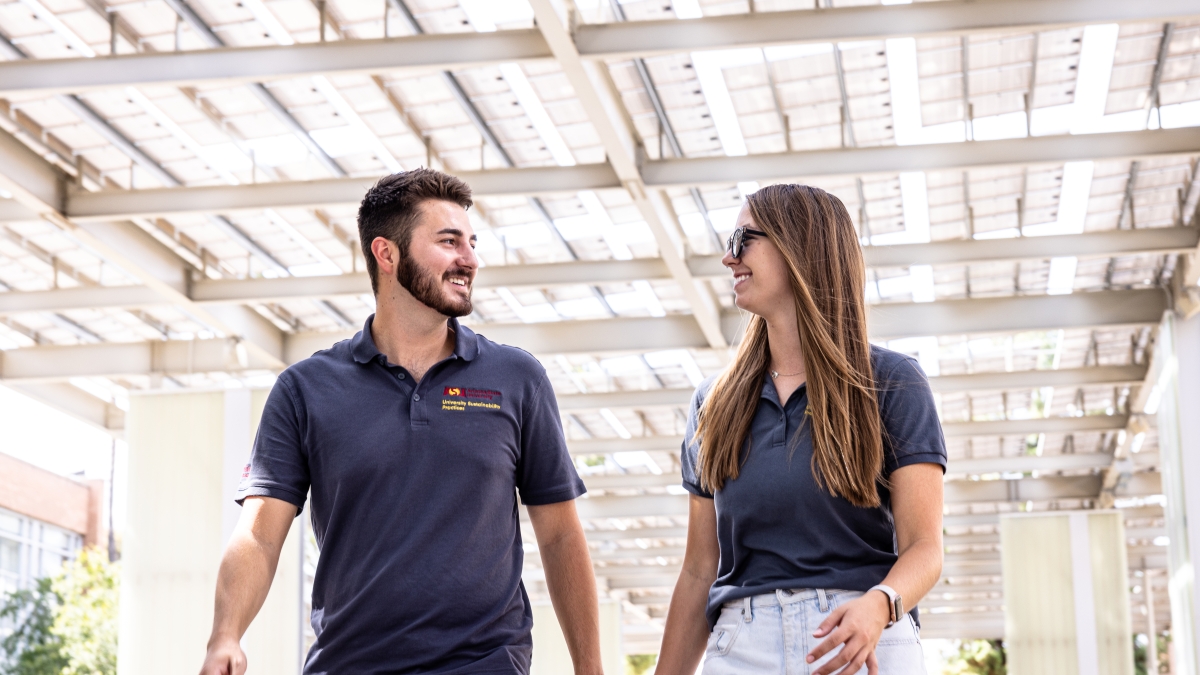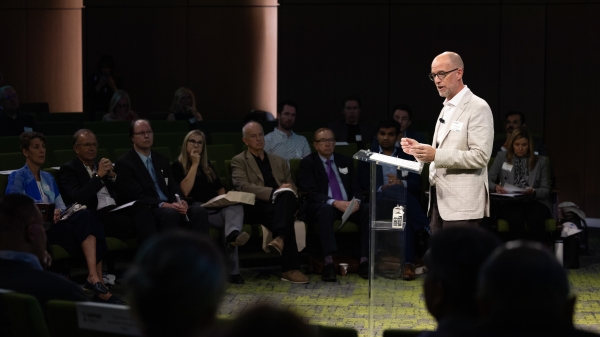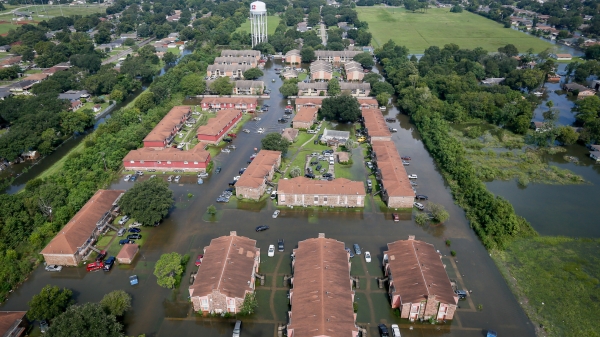The future is green: Job demand translates to high employability for ASU sustainability grads

According to ASU employment data, 90% of graduates from the College of Global Futures with a bachelor’s degree are employed in a degree-related field or go on to graduate school. ASU photo
A 2023 report by Forbes on the state of green jobs confirmed what Arizona State University has been trumpeting for years: Sustainability will play a large part in the new economy.
The report suggests that by 2030, there will be 100 million “green,” or sustainably-oriented, jobs worldwide — several of which will require specialized skills and knowledge.
That is backed by ASU’s College of Global Futures employment data, which suggests:
- Ninety percent of sustainability graduates with a bachelor’s degree are employed in a degree-related field or go on to graduate school.
- That rate is 95% for students with master’s degrees from the College of Global Futures.
- Graduates from the College of Global Futures have gone on to start careers at ICF International, Air Force Cyberworks, VOX Global and the Arizona Department of Environmental Quality, to name a few.
Christopher Boone, a professor with ASU’s School of Sustainability and former dean of the College of Global Futures, said he is pleased — but not surprised — by the news.
“It’s pretty remarkable,” said Boone, whose most recent area of study is around sustainability jobs and careers.
This fall, Boone is also collaborating with the Sustainable Cities Network on a course to explore professional skills in sustainability practice at the municipal level.
“It’s clear there is an interest from students and employers alike, given the success of our program.”
As Campus Sustainability Month at ASU comes to a close, ASU News spoke to Boone to learn more about the future for sustainability graduates and green jobs.
Question: I remember talking to sustainability graduates almost two decades ago, and it seemed to me they didn’t always find a job that matched their degree. Today is an entirely different story. What’s changed from almost two decades ago?
Answer: Early graduates from (the sustainability) program were actually quite successful in finding jobs in their field. Our first alumni surveys showed that 75% of graduates had jobs related to sustainability. It’s important to remember that nationally, only 25% of people with college degrees hold jobs related to their major.
Over the last couple of decades, sustainability has become increasingly professionalized. Chief sustainability officers have joined the C-suites of companies. A study by LinkedIn this year on fastest growing jobs placed sustainability manager at the top of the list for the United Kingdom and Germany, and sustainability analyst was the fifth-fastest growing job in the U.S. In the early days, many of our graduates had to make the case for why sustainability was important for organizations. Now the market is demanding people with sustainability and green skills.
Q: What types of career fields are we talking about and what are the salary ranges?
A: Sustainability jobs are found in all sectors — private, public and nonprofit, as well as positions in academic and education institutions. Data from our most recent alumni surveys show that nearly half our graduates are working in the private sector, followed by 20% in academic or educational jobs, 17% in government and 15% in nonprofits.
Salaries depend on years of experience and in which sector the graduates are employed. For graduates with a bachelor’s degree, the highest number reported salary ranges between $40,000-52,000 followed by $100,000 and above. For master’s degree graduates, the highest number of alumni reported salaries of $100,000 and above. A study by Trellis (formerly Greenbiz) shows that sustainability managers earn an average of $146,000, sustainability directors earn $227,000 and sustainability vice president earns $404,000.
Q: The Forbes story from 2023 has suggested by 2030 there will be 100 million green jobs worldwide. Why is there such an anticipation in these jobs?
A: The explosion of growth in green jobs is partly because of the need to address urgent challenges, such as climate change, biodiversity loss and persistent hunger. But a big reason for the growth is that sustainability is now an economic opportunity, not just a social and environmental responsibility. Governments and companies need people with sustainability and green-skills training to meet these needs and take advantage of the opportunities.
All countries have agreed through the United Nations Sustainable Development Goals to address a lot of urgent challenges — like eliminating poverty, achieving gender equity, reducing threats from climate change — and have done so for ethical reasons. It’s also important to remember that solving these challenges is an economic opportunity, a $12 trillion opportunity according to the Business and Sustainable Development Commission. There are other major shifts underway, such as the transition from fossil fuels to renewable energy, that are driving a lot of the green and sustainability jobs growth.
Q: At ASU, all students are required to take a class in sustainability. How does this enhance their education and what impact is this having on your programming?
A: Sustainability is a way of thinking that can add value to all majors. It gives you a way to understand the interconnected social, environmental and technical systems so that you can make better decisions for present and future generations while protecting the life-supporting ecosystems we all depend on. Sustainability also applies to a wide variety of careers.
For example, sustainable fashion is one of the fastest growing green jobs. Sustainability is also a wanted skill in finance, engineering, law and many other fields. To help students meet the new general studies requirement for sustainability at ASU, we have refreshed many of our first-year courses — including SOS 100, Introduction Sustainability — which is also available to any learners through Study Hall, an innovative collaboration between ASU, Google, YouTube and Crash Course.
Q: What are the opportunities for colleges and universities to collaborate and lead to job opportunities for the next 25 years?
A: Collaborating with other colleges and universities nationally and internationally to offer quality sustainability programs will be necessary to meet the exploding demand for green and sustainability jobs. We now have more green and sustainability jobs than the number of people qualified to fill those positions. Also, sustainability is a rapidly evolving field. To keep sustainability programs relevant and up to date, ASU and other colleges and universities need to work closely with employers to understand their changing needs and priorities. Colleges and universities also have an opportunity to provide lifelong learning to organizations so they can keep up with the latest thinking in the field.
ASU is especially renowned in meeting the needs of lifelong learners, a model that other colleges and universities are looking to replicate. This is good because we need to rapidly scale the number of learning opportunities in sustainability if we are going to meet the goals of improved well-being for present and future generations while stewarding the health of the environment.
More Environment and sustainability

NOAA, ASU offer workshop to bridge ocean exploration, education
Oceans are vital to sustaining life on Earth, as they produce over half of the oxygen we breathe and play a crucial role in regulating the planet's climate. They also support a diverse array of…

A united front for sustainability and the economy
When four leaders of esteemed learning institutions and the mayor of Phoenix gather in one location at the same time, it’s a tip-off that something big is going down.When they’re joined by visionary…

NSF-funded, ASU-led research network tackles flood justice
Like many environmental risks, flooding exacerbates preexisting social inequalities, with marginalized communities often bearing the brunt of its impact.In a groundbreaking effort to address those…
